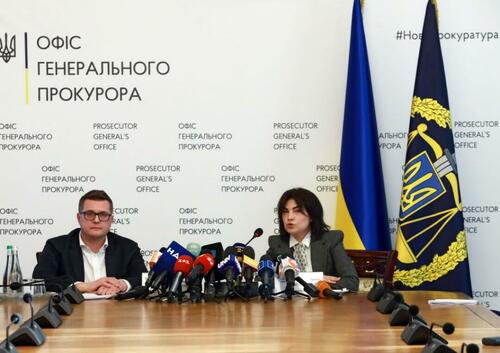Zelensky Fires Spy Chief For ‘Russian Infiltration’ In Biggest Internal Purge Since War Began
Typically it is any rumored firings of top Russian staff that is focus of global headlines, but on Sunday it was widely reported that President Volodymyr Zelensky abruptly fired his spy chief who runs the powerful domestic security agency, the SBU. In the top level shake-up Ukraine’s state prosecutor general Iryna Venediktova, responsible for prosecution of Russian war crimes, was also announced dismissed.
The now fired spy chief, Ivan Bakanov, came especially as a surprise given he’s a childhood friend of Zelensky’s, and given the administration’s reluctance to publicize any major move that could make the government look weak or fragmented amid the ongoing Russian assault focused in the east and south.
The firings are being widely perceived as the biggest political sackings since Russia’s Feb. 24 invasion kicked off, and suggests there could be more to come.
As Reuters details of the president’s rationale behind the move, “In a Telegram post, Zelenskiy said he had fired the top officials because it had come to light that many members of their agencies had collaborated with Russia, a problem he said had touched other agencies as well.”
“He said 651 cases of alleged treason and collaboration had been opened against prosecutorial and law enforcement officials, and that more than 60 officials from Bakanov and Venediktova’s agencies were now working against Ukraine in Russian-occupied territories.”
The suggestion is that Bakanova allowed the problem of infiltration, moles, and internal compromise to fester. “Such an array of crimes against the foundations of the national security of the state… pose very serious questions to the relevant leaders,” Zelenskiy said in his statement. “Each of these questions will receive a proper answer.”
The problem is no doubt further compounded by likely pro-Russian sympathies among some sectors within both intelligence and military agencies, given that prior to the war, large swathes of the East and South of country could be generally viewed as pro-Moscow in their political and cultural leanings. Additionally, most or much of the country’s population can speak the Russian language. Zelensky also framed the sudden firings in top, highly visible posts as ultimately a crisis of leadership, allowing lower officials to begin to lose confidence in the administration’s ability to weather the storm of the Russian invasion. This also as there’s lately been greater and greater acknowledgement of low morale among Ukrainian troops in the Donbas, where Russian shelling has been relentless, while on the Ukrainian side there’s a persistent shortage of artillery and munitions to keep pace with Russian reinforcements.
On the question of the war, the Zelensky government on Monday said that it will not be open to direct peace negotiations until “victory” is achieved on the battlefield, suggesting a very long haul conflict still to come.
Tyler Durden
Mon, 07/18/2022 – 12:30

